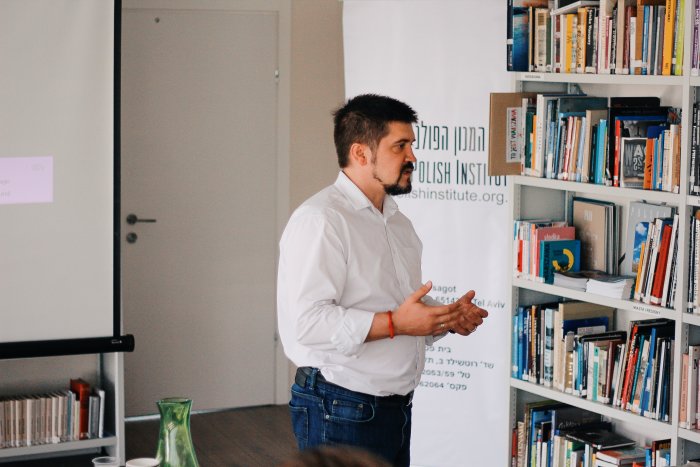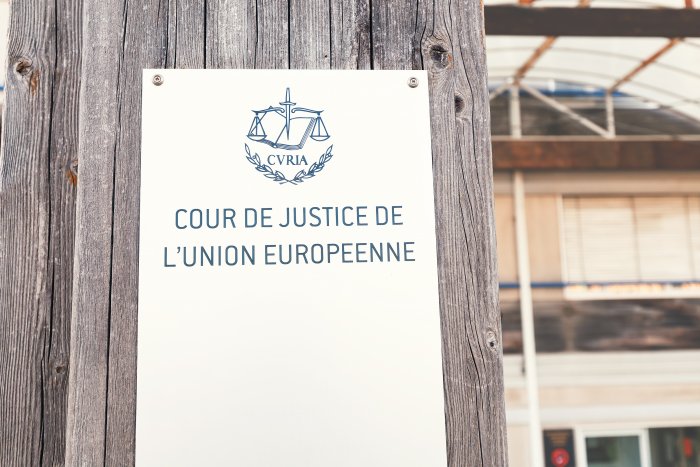Taking Regional Entrepreneurs on the Road

The Budapest Business Journal follows the latest group of Visegrad Four startups on their roadshow to Tel Aviv.
Roland Dávid, managing director of Innoria Kft.
Anyone travelling to Tel Aviv between April and October should not really bother checking the weather report beforehand as temperatures rarely dip below 30ºC (86ºF). On September 5, it is particularly hot and humid, unfortunately for the attendees of DLD Tel Aviv, an innovation conference organized at the city’s Old Train station – mostly outside.
It’s not clear if it’s the weather, or the fact that the majority of participants are startups but speakers are quite dressed down for the event. Most get away with wearing jeans or even leggings. Presentations held inside what used to be a waiting hall are infiltrated with constant chatter from the audience. Panel members are introduced with as much fanfare as bands at music festivals. (This feeling only gets stronger when you realize that, in between sessions, an actual band is playing live.)
Outside is a more traditional line-up of booths: enterprises, state innovation agencies with their brochures and freebies piled up are trying to catch the attention of potential investors. Among the participants are four Hungarian startups that also came in the hope of building some business ties.
One is Violacity, a young urban tech enterprise, whose smart bike rack preventing theft makes carrying a heavy lock unnecessary. The steel arms of the sturdy stationary system lock the bike safely either with a code sent by SMS, or by using fingerprints, or with a loyalty card.
The founders, Szabolcs Szilágyi and Márk Boros, aim to target stores, cafés, shopping malls, etc. Not only because this is where most thefts take place, but also as cyclists tend to spend more – on average EUR 1.7 more according to Violacity’s survey of bikers – if they know their bikes are safe.

Szabolcs Szilágyi, CEO of Violacity.
Performing Better
Another is Innoria which, using EEG (electroencephalography) and artificial intelligence, is capable of distinguishing real time between states of mind. What is more, it does so in groups of up to 4 (up to now, only one person at a time could be tested). Based on the results, it is able to tell if the people would make a good team or what could be done to help them perform better under pressure.
The system has already been tested on sporting shooters and will be introduced at Lajos Mocsai’s handball academy. It can also serve HR professionals. The creators are still developing the system: in one year’s time, they promise, it will be able to make recommendations to coaches and later replace them, or at least part of what they do, completely.
The companies arrived in Tel Aviv as part of the Startup Campus V4 Global Tour, a series of study and networking trips organized for entrepreneurs from the CEE region by Startup Campus. As part of Enterprise Hungary, Startup Campus supports Hungarian and regional enterprises in their growth, product development and market acquisition.
Yet, unlike similar organizations, incubators and accelerators, which generally focus on one goal, Startup Campus has a more holistic approach. From running courses at universities, for example at Imperial College London for Hungarians students to encourage them to start/grow their startups, to helping budding enterprises validate their products/services abroad via its network and foreign representations already operational in Berlin and London, to organizing study and networking trips to foreign markets, they deal with everything.
Modified Models
Thus far, some 32 enterprises have participated at the Startup Campus V4 Global Tour launched this year: they have primarily been selected based on their potential to do business on the markets the tour covered including New York/Boston, Hong Kong, Berlin, and Istanbul. Many of the startups have been called back for further negotiations and many have modified their product or business model, based on the feedback received from experts.
In Tel Aviv, too, probably the most valuable session of the trip, which has meetings with local investors or briefings on local business culture, is when the entrepreneurs are pitching for the head of an advisory connecting investors and corporations with tech startups. Some are doing quite badly, but that’s not a problem. After all, they are here to improve and sparking investors’ interest in one minute is no easy job.
“It’s like dating”, says Zsolt Kovács, the CEO of Enterprise Hungary. “You have about a one-minute window to ask someone out. If you succeed, you’ll have more time to talk later and they may not choose to go out with you based on that first conversation. But you have to catch their attention to be able to continue.”
At the closing event of the trip, a party at co-working office provider Mindspace’s rooftop terrace, startups have another go at trying the skills they have learnt. In this laid-back setting, networking is easier and some of them do manage to make some connections they can hopefully make good use of in the future.
Startup Campus V4 Global Tour
The main sponsor of the Global Tour is the Hungarian Ministry of Foreign Affairs and Trade. The campus is also partnered with the state-owned Hiventures Venture Capital Fund and the old Hungarian National Trading House, but Startup Campus finances most of its programs from tenders and its own capital. Its services, mostly non-profit at this stage, are not restricted to local startups, but offered to regional outfits as well. “Selling” an entire region to foreign investors (especially those from overseas) makes more sense than focusing on just one country. It is also more sustainable in the long run as to be able to continue to expand, the organization is starting to charge for some of its services. Beyond the existing network and decentralized incubators in destinations like London and Berlin, Startup Campus is planning to open new sites outside Europe as well.
SUPPORT THE BUDAPEST BUSINESS JOURNAL
Producing journalism that is worthy of the name is a costly business. For 27 years, the publishers, editors and reporters of the Budapest Business Journal have striven to bring you business news that works, information that you can trust, that is factual, accurate and presented without fear or favor.
Newspaper organizations across the globe have struggled to find a business model that allows them to continue to excel, without compromising their ability to perform. Most recently, some have experimented with the idea of involving their most important stakeholders, their readers.
We would like to offer that same opportunity to our readers. We would like to invite you to help us deliver the quality business journalism you require. Hit our Support the BBJ button and you can choose the how much and how often you send us your contributions.







